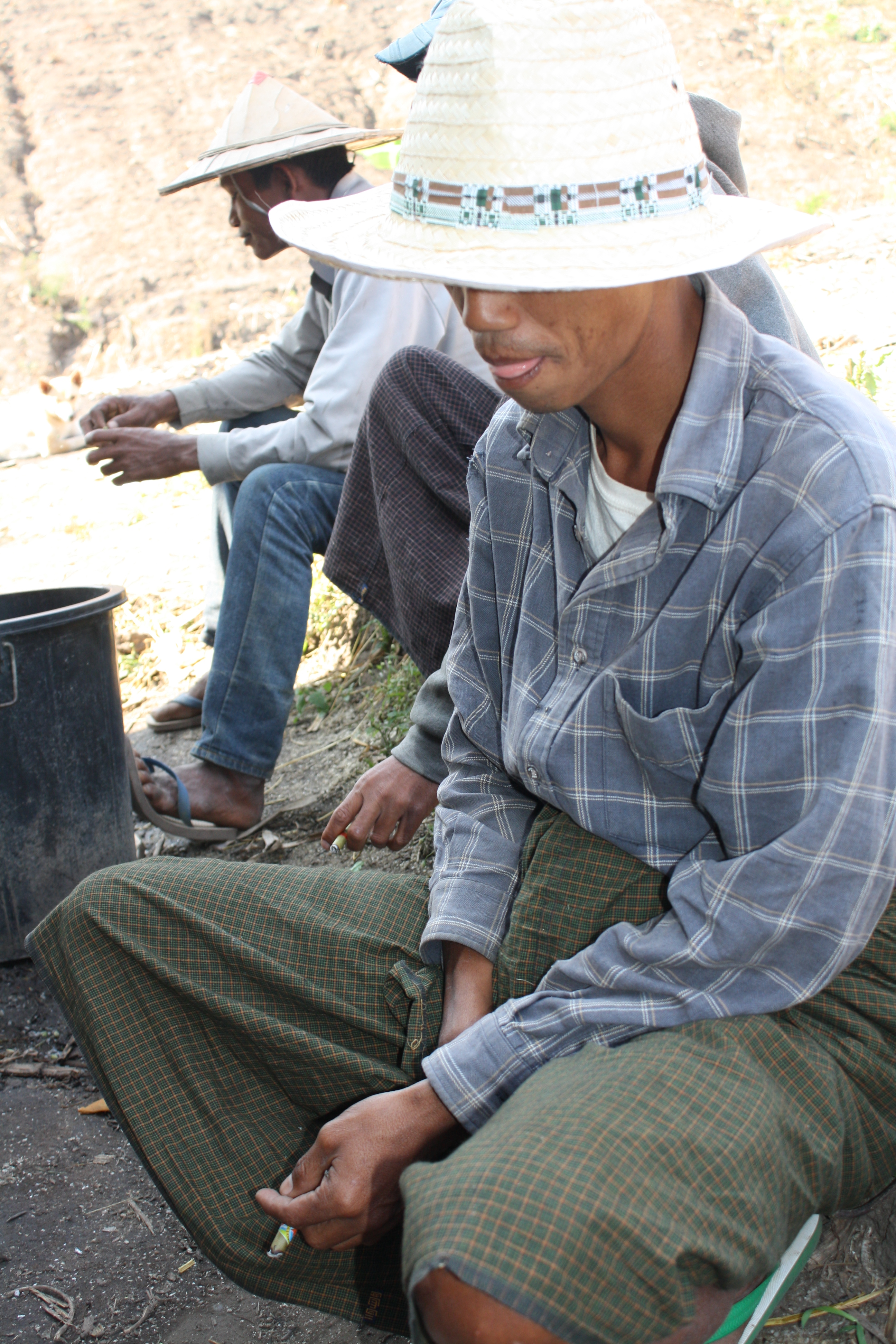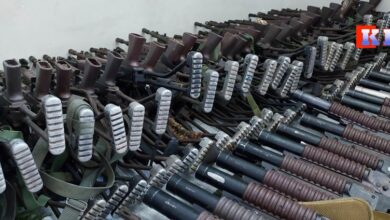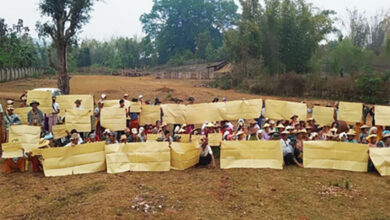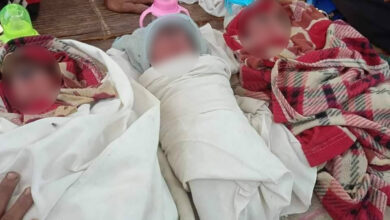Cheated into Servitude: A Convict Porter’s Story

A former convict porter speaks to reporter Cha Mu about his arrest and imprisonment for drug use, and his subsequent conscription by the military as a porter in Karen State.
My name is Tin Hlaing. I am a 35-year-old ethnic Burman. I’m single and have six siblings. On July 15, 2008, I was arrested at the Than Lin bridge with three of my friends. I was carrying marijuana in my bag, just enough for four cigars. I am not a seller of marijuana; I just use it for myself.
I smoked marijuana because I was not allowed to go school after the 1988 uprising, or 8-8-88. During the uprising, I was just a high school student and did not know much about it. However, I used to go and talk to university students who participated. Because of this, when I applied for the school, I was refused.
After my arrest, I was sentenced to 15 years in prison and sent to Mokpalin prison in Mon Township. The prison commander, U Kyaw Soe, was a very corrupt man. While at the prison, the prisoners were forced to dig and carry rocks. I was imprisoned for almost three years before I was taken by the military to become a porter.
One day, prison authorities told us that there would be work outside the prison building a road on the Thai-Burma border. They said that anyone who would like to be taken for this work could go there. So I decided to go to do this work.
There were 30 of us prisoners who left the prison and traveled to where soldiers from the Burmese army’s Battalion 357 had arranged to collect us. Within a few days, I suddenly realized that we had been told a lie and we were being sent to work as war porters on the Thailand-Burma border, where fighting had broken out between Burmese troops and a DKBA [Democratic Karen Buddhist Army] brigade that did not want to participate in the Burmese junta’s Border Guard Force scheme.
“They do not choose as porters any military deserters, who were also with us in jail, because they know how to shoot guns. The Burmese soldiers were afraid that these prisoners would take their guns and shoot them.
At first the SPDC soldiers talked very nicely to us. But when we arrived in the battle area, they started showing their true colors by speaking to us very rudely, swearing at us, kicking us with their jungle boots and sometimes hitting us with the butts of their guns. We were forced to carry baskets full of water, yellow beans, 15 kilograms of rice, 120mm mortar shells and soldiers’ backpacks. The soldiers only carried their guns and wore a bullet belt around their waist.
When the soldiers on patrol entered a village, they stole everything they could find, spoons, pots, pans and plates, and put them in our baskets. When our baskets were full, they tied the stolen goods on the side of our baskets. So the baskets on our backs looked like Christmas trees. Our baskets were very heavy, weighing almost 30 viss [about 48 kilograms], and when we put them on our backs, we could not walk with our backs straight. Most of the porters were over 40 years old and none of them were under 18 years old. I have seen some porters who were no longer able to carry their loads be kicked very hard in the legs, and even shot and killed.
Also, when the soldiers entered a village, they smashed the windows of the houses and broke down the doors if they were locked. Should the people go back to their villages, they would see that they have no belongings left in their houses. Not even a single plate was left for the villagers. They also took the villagers’ beds and put them on the ground to sleep on. All the houses in the border village of Palu Poe [south of Myawaddy] are now empty and damaged.
“Whenever we ate our meals, we were not allowed to use the spoons and plates that we had to carry. The soldiers used them and we had to eat by hand from the plastic bags. The food for the soldiers was sardines, dry fish, milk and bean curry. For us porters, we had to eat rice, fish paste, papaya and beans. We could not have them all in the same meal. In the morning, we could only have fish paste, and in the evening only rice with beans. The solders did not give us enough time for our meals, as we had to walk all the time. So when we opened our rice in the plastic bag, it was already rotten; we had to eat it anyway, because it was all we had.
The soldiers do not walk on the street or the path because they are afraid of landmines. They even climb very steep mountains to avoid them. They forced us to walk in front of them with minesweepers and made us clear away the landmines. Sometimes the soldiers forced us to go into damaged houses to get fruit like papaya, coconut and banana, since they dared not go themselves for fear of landmines.
We felt that that the solders would force us to carry the heavy loads until we died. So we decided to escape, even if it meant our deaths. If we continued to stay with them, we would have surely suffered more or died. We were not afraid of the KNU [Karen National Union] or DKBA, should we have met them. We believed that they would not shoot or kill us. But even if they wanted to kill us, they would have shot us and we would have died directly. We did not need to suffer more burdens and physical abuse by the Burmese soldiers.
While in prison, we heard from friends who used to be military porters that the KNU would not shoot us; they would only shoot the Burmese soldiers. We saw that every soldier had one set of ordinary clothing, which they sometimes wore on the battlefield. At times, they exchanged their clothing with ours so that the DKBA and KNU would not shoot at them. Sometimes we found that the soldiers were very scared and afraid.
At 11am on December 13, 2010, some soldiers told my friend and me to fetch water from the Moei river. They had just come back from fighting, were tired and were eating lunch. Usually every time they asked us to fetch water, they followed us with guns, but on that day none of them followed us. So we decided to escape and hid in the bush by the side of the river. The soldiers came looking for us but did not find us. They talked among themselves and said, “Oh, they have already crossed to the other side of the river.”
When it became dark we crossed the river. When we got to the Thai side we slept on a pile of straw. In the morning, we met some villagers who had crossed the river to Thailand to flee the fighting at their village. They shared their food with us and we stayed with them.
This is my story about being tricked into becoming a military porter. With recent battles that have been fought nearly continuously in the last few months in Karen State, the Burmese military is using more and more convicts like me to carry their supplies and ammunition into the battle area and conduct minesweeping. I have heard that the reason why the SPDC uses convicts as porters is because a United Nations criticizes them regime if they use regular civilians.
If we commit a crime we should receive a fair punishment, but we should not be forced or tricked into being a military porter. Convicts are human beings, too. Is it fair for someone like me, who was being punished for having only a little marijuana, to carry heavy loads onto the battlefield, sweep for mines, be beaten and be shot? I don’t think so.
I ask people outside of Burma who read this to urge their governments and the United Nations to put stronger pressure on the Burmese government to stop using convict porters.




